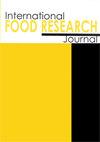In vitro evaluation of anticancer, antiviral, and antioxidant properties of an aqueous methanolic extract of Rhus typhina L. leaves
IF 1
4区 农林科学
Q4 FOOD SCIENCE & TECHNOLOGY
引用次数: 0
Abstract
In recent decades, natural products of plant origin have predominated among the sources of new therapeutic agents. Plants, which are intensively used in folk medicine, are the focus of particular interest, and being subjected to in-depth analyses for the assessment of their pharmacological properties. The objective of the present work was to evaluate the in vitro anticancer, antiviral, and antioxidant properties of a crude aqueous methanolic extract from the leaves of Rhus typhina L., which is a plant species with broad applications in traditional phytotherapy. The anticancer capacity of the extract was assessed on two human breast cancer cell lines (MCF7 and MDA-MB-231) using the 3-(4,5-dimethylthiazol-2-yl)-2,5-diphenyl tetrazolium bromide (MTT) cell proliferation assay, and its cell growth inhibitory effect on cancer cells was compared with its action on a non-cancerous breast epithelial cell line (MCF10A). Moreover, the in vitro antiviral activity of the plant extract was studied against viral strains of three taxonomic groups: herpes simplex virus type 1 (HSV-1), coxsackievirus B1 (CVB1), and influenza A virus (IAV/H3N2) using a cytopathic effect inhibition test, extract cytotoxicity evaluation through the neutral red uptake assay, a virucidal assay, a viral attachment assay, and cell pre-treatment with the extract. In turn, a radical scavenging assay with 2,2-diphenyl-1-picrylhydrazyl (DPPH) was applied to explore the antioxidant potential of R. typhina leaf extract. Results indicated that the plant extract possessed antiproliferative activity against the tested cell lines which was stronger toward cancer cells. A modest inhibitory effect on IAV/H3N2 replication was detected; as well as on an effect on herpes virions and on the adsorption of the HSV-1 and IAV/H3N2 strains; and a protective effect on uninfected cells before HSV-1 contact. The leaf extract of R. typhina also exhibited a strong free radical scavenging activity. The results of the present work demonstrated the pharmacological potentials of the plant extract, which warrants further and more detailed study in the future.红豆杉叶甲醇水提物抗癌、抗病毒和抗氧化性能的体外评价
近几十年来,植物来源的天然产物在新型治疗剂的来源中占主导地位。在民间医学中广泛使用的植物是特别感兴趣的焦点,并受到深入分析以评估其药理特性。摘要对传统植物治疗中具有广泛应用价值的红蛇叶甲醇粗提物进行了体外抗癌、抗病毒和抗氧化活性研究。采用3-(4,5-二甲基噻唑-2-酰基)-2,5-二苯基溴化四唑(MTT)细胞增殖试验,对两种人乳腺癌细胞株MCF7和MDA-MB-231的抑癌能力进行了评价,并比较了其对癌细胞的抑制作用及其对非癌性乳腺上皮细胞株MCF10A的抑制作用。此外,通过细胞病变效应抑制试验,通过中性红摄取试验、杀病毒试验、病毒附着试验评估提取物的细胞毒性,以及用提取物进行细胞预处理,研究了植物提取物对单纯疱疹病毒1型(HSV-1)、柯萨奇病毒B1 (CVB1)和甲型流感病毒(IAV/H3N2)三个分类群的体外抗病毒活性。利用2,2-二苯基-1-苦味酰肼(DPPH)清除自由基的实验来研究斑疹红叶提取物的抗氧化能力。结果表明,该植物提取物对肿瘤细胞具有较强的抗增殖活性。检测到对IAV/H3N2复制有适度抑制作用;以及对疱疹病毒粒子和对HSV-1和IAV/H3N2株的吸附的影响;在接触1型单纯疱疹病毒之前对未感染的细胞有保护作用。斑竹叶提取物也表现出较强的自由基清除活性。本研究结果显示了植物提取物的药理潜力,值得在未来进行更详细的研究。
本文章由计算机程序翻译,如有差异,请以英文原文为准。
求助全文
约1分钟内获得全文
求助全文
来源期刊

international food research journal
Agricultural and Biological Sciences-Food Science
CiteScore
1.40
自引率
0.00%
发文量
75
期刊介绍:
The International Food Research Journal (IFRJ) publishes papers in English, six (6) issues a year with the coverage of:
Food Science and Technology
Nutrition and Dietetics
Agriculture, multidisciplinary
Chemistry, multidisciplinary
The scope of the Journal includes:
Food Science, Food Technology and Food Biotechnology
Product Development and Sensory Evaluation
Food Habits, Nutrition, and Health
Food Safety and Quality
Food Chemistry, Food Microbiology, Food Analysis and Testing
Food Engineering
Food Packaging
Food Waste Management
Food Entrepreneur
Food Regulatory
Post-Harvest Food Management
Food Supply Chain Management
Halal Food and Management
 求助内容:
求助内容: 应助结果提醒方式:
应助结果提醒方式:


